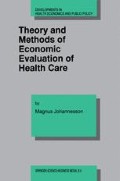Abstract
Economics is concerned with the allocation of scarce resources. The amount of resources (labour, materials, natural resources, etc) available to a society can be considered as fixed at a given moment of time. This means that choices have to be made concerning how to use these resources, e.g. the amount of education that is provided can only be increased if the production of some other goods is decreased.
Access this chapter
Tax calculation will be finalised at checkout
Purchases are for personal use only
Preview
Unable to display preview. Download preview PDF.
References
Arrow KJ. Social choice and individual values. New Haven Connecticut: Yale University Press, 1951. Baumol WJ. Economic theory and operations analysis. 3rd edition. London: Prentice Hall, 1972.
Baumol WJ. Contestable markets: an uprising in the theory of industry structure. American Economic Review 1982; 72: 1–15.
Bergson A A reformulation of certain aspects of welfare economics. Quarterly Journal of Economics 1938; 52: 310–334.
Boadway RW, Bruce N. Welfare economics. Oxford: Blackwell,1984.
Hicks JR. The foundation of welfare economics. Economic Journal 1939; 49; 696–712.
Johansson P-O. An introduction to modem welfare economics. Cambridge: Cambridge University Press, 1991.
Johansson P-O. Evaluating health risks: an economic approach. Cambridge: Cambridge University Press, 1995.
Kaldor N. Welfare propositions of economics and interpersonal comparisons of utility. Economic Journal 1939; 49: 549–552.
Leonard HB, Zeckhauser RJ. Cost-benefit analysis applied to risks: its philosophy and legitimacy. In MacLean D (Ed.). Values at risk. Totowa N.J.: Rowman, and Allanheld, 1986.
Phelps CE. Health Economics. New York: HarperCollins, 1992
Rawls J. A theory of justice. Cambridge MA: Harvard University Press, 1971.
Samuelson PA Foundations of economic analysis. Cambridge MA: Harvard University Press, 1947.
Winston WL. Operations research: applications and algorithms. Second edition. Boston: PWS-Kent Publishing Company, 1991.
Author information
Authors and Affiliations
Rights and permissions
Copyright information
© 1996 Springer Science+Business Media Dordrecht
About this chapter
Cite this chapter
Johannesson, M. (1996). Welfare Economics. In: Theory and Methods of Economic Evaluation of Health Care. Developments in Health Economics and Public Policy, vol 4. Springer, Boston, MA. https://doi.org/10.1007/978-1-4757-6822-0_2
Download citation
DOI: https://doi.org/10.1007/978-1-4757-6822-0_2
Publisher Name: Springer, Boston, MA
Print ISBN: 978-1-4419-4757-4
Online ISBN: 978-1-4757-6822-0
eBook Packages: Springer Book Archive

